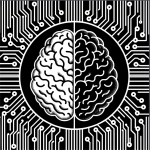In Memoriam, George Landow
Robert Arellano
The editors at ebr asked Bobby Arellano to draft a reflection on the passing of George Landow. Working with Landow in the early years of the Victorian Web, Arellano transferred most of the documents from the Intermedia system into Storyspace and relinked them. We present Arellano's reflection, in memoriam, along with an official obit provided by Ruth Landow (George's friend of 78 years and his wife of 57 years).
Off Center Episode 3: Artistic Research and Digital Writing, with Jason Nelson
Scott Rettberg, Jason Nelson
On this episode of Off Center, Scott Rettberg is joined by artist and poet Jason Nelson to discuss the background behind Jason's weird and intriguing work, creativity in the digital age and the intersection between art and research. Behind every artist there is a story, and Jason's include disappearing masonic rings, Brazilian televangelists and city planning.
MATERIALS FOR A LIFE: “whispered conversations: beholding a landscape through journey and reflection” at Stand 4 Gallery
Joseph McElroy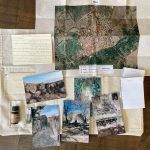
A post-closing catalog essay on a curious and original exhibition, one that rethinks the very idea of a group show, from singular research journeys by Kate Collyer (not her first) to Alaska, Megan Porpeglia to Sardinia (on a residency for the first time visiting her family roots), and Lorrie Fredette to Cape Cod. Like McElroy's own literary works, these twenty-two artworks are presented through several shifting lenses.
Off Center Episode 2: Joseph Tabbi on the Electronic Book Review, Research Infrastructure, and Electronic Literature
Scott Rettberg, Joseph Tabbi
CDN Director Scott Rettberg and the Center's Principle Investigator Joseph Tabbi discuss the decades-long development of a born-digital, community based publication. The Electronic Book Review brings together literary scholars and conceptual artists from a widening set of disciplines and geographical regions. While foregrounding critical discourse, the journal will bring to our readership the sorts of activities that we'll be featuring in our e-lit node: activities which we designate as a Publishing And Infrastructure Group (PAIG). As our readers pick up on things that our authors have written, they too become an active part of our discursive community. Debates and dialogues are thus the order of the day, as authors and audiences begin to merge.
Harlin/Hayley Steele Netprov Interview
Hayley Steele, Rob Wittig
Rob Wittig and Harlin/Hayley Steele — a larpmaker and media artist whose work explores tactical performance and “narrative care,” a collaborative process of excavating narratives that have been pushed underground through systematic forms of harm — discuss Harlin/Hayley’s roots in the live action roleplaying (LARP) world and synergies between LARP and netprov. While laughing a lot.
Off Center Episode 1: Introducing the Center for Digital Narrative, with Jill Walker Rettberg
Scott Rettberg, Jill Walker Rettberg
Scott and Jill Retberg, directors of the Center for Digital Narrative (CDN) at the University of Bergen, discuss their motivations and goals for the new research center. Digital narrative encompasses various fields such as electronic literature, game studies, AI, VR, social media narratives, and computational narrative systems. The podcast aims to explore the frontiers of digital narrative by engaging with researchers, artists, and authors in these fields. CDN aims both to produce new research and creation in digital narrative and to present ideas in a more accessible way, such as through exhibitions and popular forms of publication to reach a broader audience. The Off Center podcast is a released on a biweekly basis, and we will be releasing selected transcripts each month on ebr.
Davin Heckman’s Re-Riposte
Davin Heckman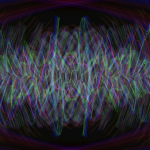
Accepting Søren Bro Pold's proclamation that "the social knowledge base of the University has already disappeared", Davin Heckman locates a few, forward looking prospects for a reconstruction of the Humanities in Jean-François Lyotard's "famously sloppy" Postmodern Condition (1971), Hannah Arendt's Human Condition(1958), and Imanuel Kant's prescient hope that the University could serve as a "mediating nexus among a growing array of conflicting professional tendencies."
Digital Histories: A review of Astrid Ensslin’s Pre-web Digital Publishing and the Lore of Electronic Literature
Alexandra L. Martin
Martin reviews Astrid Ensslin's Pre-Web Digital Publishing and the Lore of Electronic Literature, a book that addresses the knowledge gaps surrounding the early era of digital creation and publishing, while testifying to the necessity for multidisciplinary approaches to this field of study. Martin discusses the reconstructivist stance from which Ensslin labors to embed digital literature into our larger understanding of the literary arts.
Classifying the Unclassifiable: Genres of Electronic Literature
Reham Hosny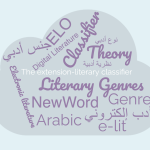
Reham Hosny (University of Cambridge and Minia University) asserts that works of e-lit resist straightforward classification due to their "hybrid and mosaic nature." This complexity poses formidable hurdles in the development of computational models aimed at categorizing e-lit into distinct genres. The challenge is further compounded by issues such as media format obsolescence, ephemerality, interactivity, and the wide array of manifestations across different platforms. Despite these formidable challenges, Hosny not only explores potential solutions but also provides a comprehensive framework for understanding the core issues associated with the classification of e-lit.
From Datarama to Dadarama: What Electronic Literature Can Teach Us on a Virtual Conference’s Rendering of Perspective.
Malthe Stavning Erslev, Christian Ulrik Andersen, Søren Bro Pold, Pablo Velasco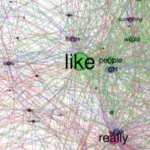
On this first Sunday in July 2023, as the Electronic Literature Organization prepares for its meeting in Coimbra, Portugal, we present a set of reflections by four ELO members who co-organized this Organization's 2021 conference fully virtual conference, titled "Platform (Post?) Pandemic." What we have is an insightful critique of platform conferencing. The concepts of datarama turned dadarama offer a refreshingly literary way of reorienting the discourse of the ELO's annual conference.
Modelit: eliterature à la (language) mode(l)
John Cayley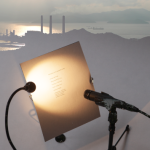
Cayley's image is an apt illustration of an essay that's also a work of 'digital language art.' Although Cayley incorporates new material and newly contextualized examples, referring chiefly to his own work, what follows is also the reconfigured rewrite of a recent essay for a series of conferences and a peer-reviewed online journal, Political Concepts, which can be found online at: https://www.youtube.com/watch?v=LDJRQYRWpvQ.
Cyborg Authorship: Writing with AI – Part 1: The Trouble(s) with ChatGPT
Scott Rettberg
In this anticipation of John Cayley's ebr essay on Artificial Intelligence, Scott Rettberg contextualizes some of the ethical and systemic problems of ChatGPT and argues that works of electronic literature and digital art might serve as tutor texts for understanding effects of technological mediation on humanity.
The development of Internet Fiction in China, from Internet sub-culture to mainstream literature
Serafina Aquilino
"Why," Serafina Aquilino asks, "is Internet literature so popular in China, compared to other countries?" The answer may be found in the Chinese "unique literary production." Print, nothing less, is responsible for China's world leadership in e-Lit. An unexpected emergence that Aquilino describes in her "brief history" of e-Lit in China, from Cai Zhiheng’s The First Intimate Contact (1998) to the present rise of Chinese literary forums and literary websites.
Response to John Cayley’s ‘Modelit’
Stephen Dougherty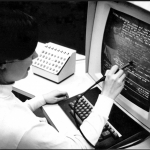
In his response to John Cayley, Dougherty takes the current concern with AIwriting as an opportunity to revive one of ebr's long-running threads; namely: the critical, contrarian riPOSTe.
